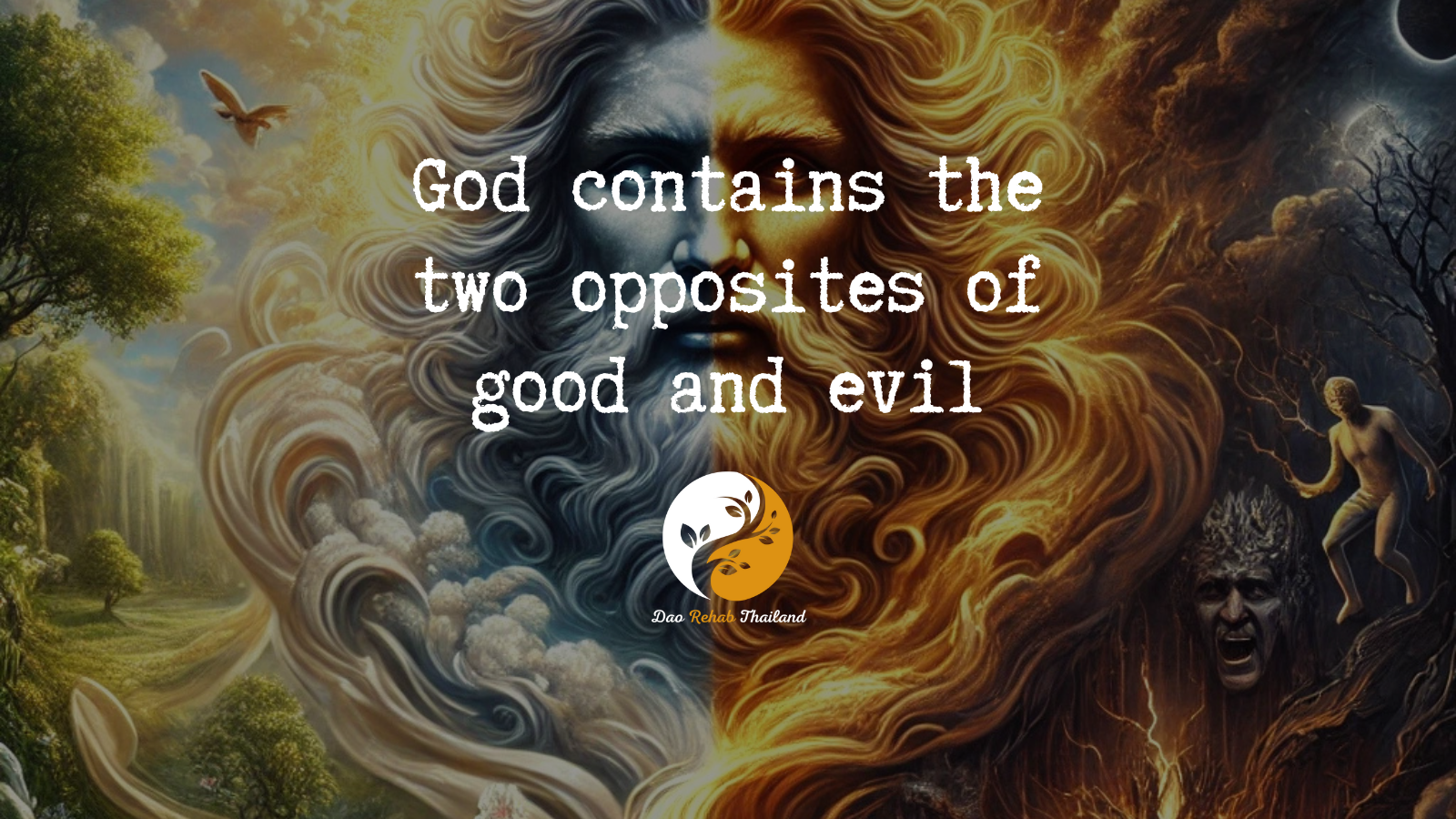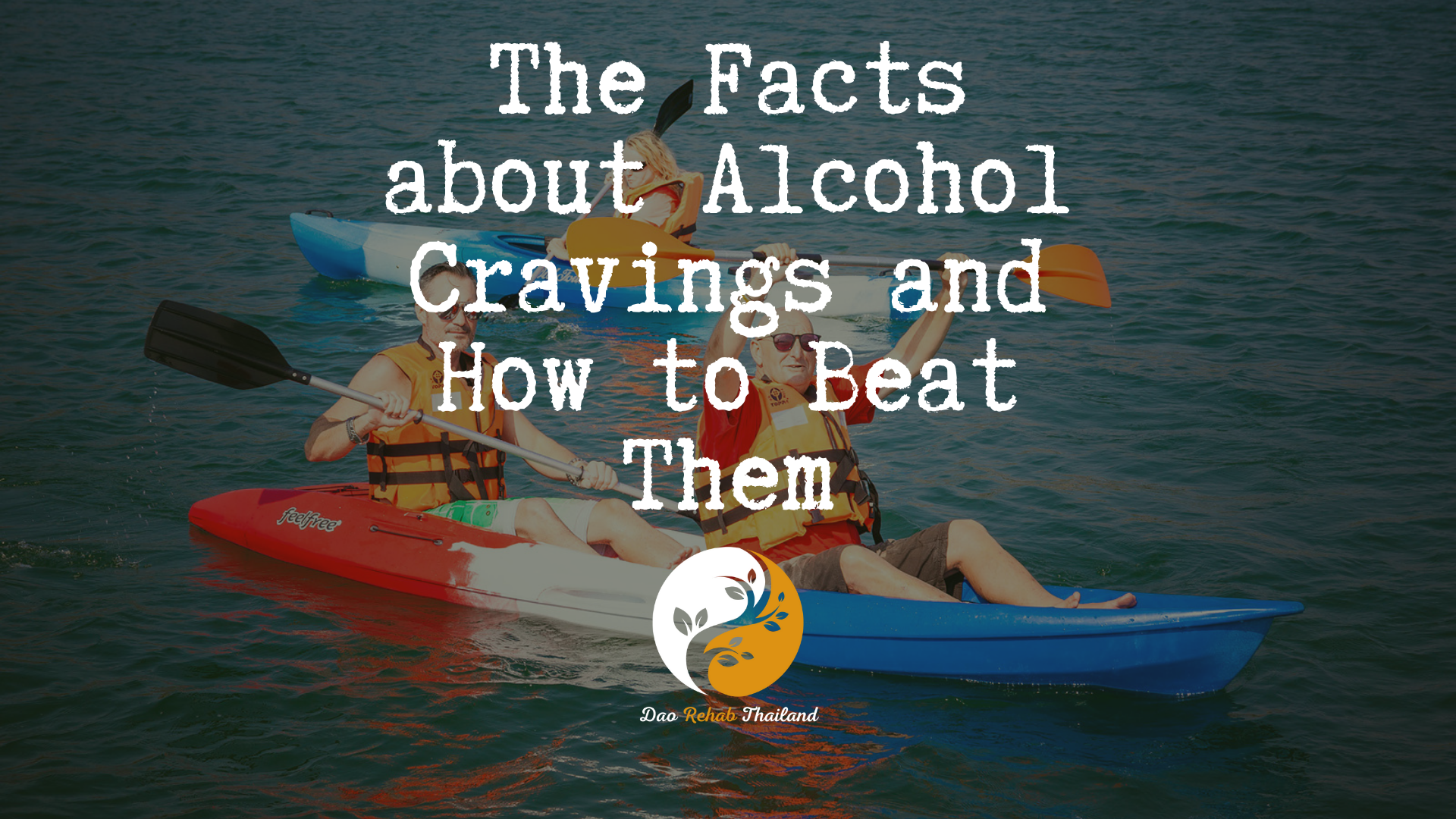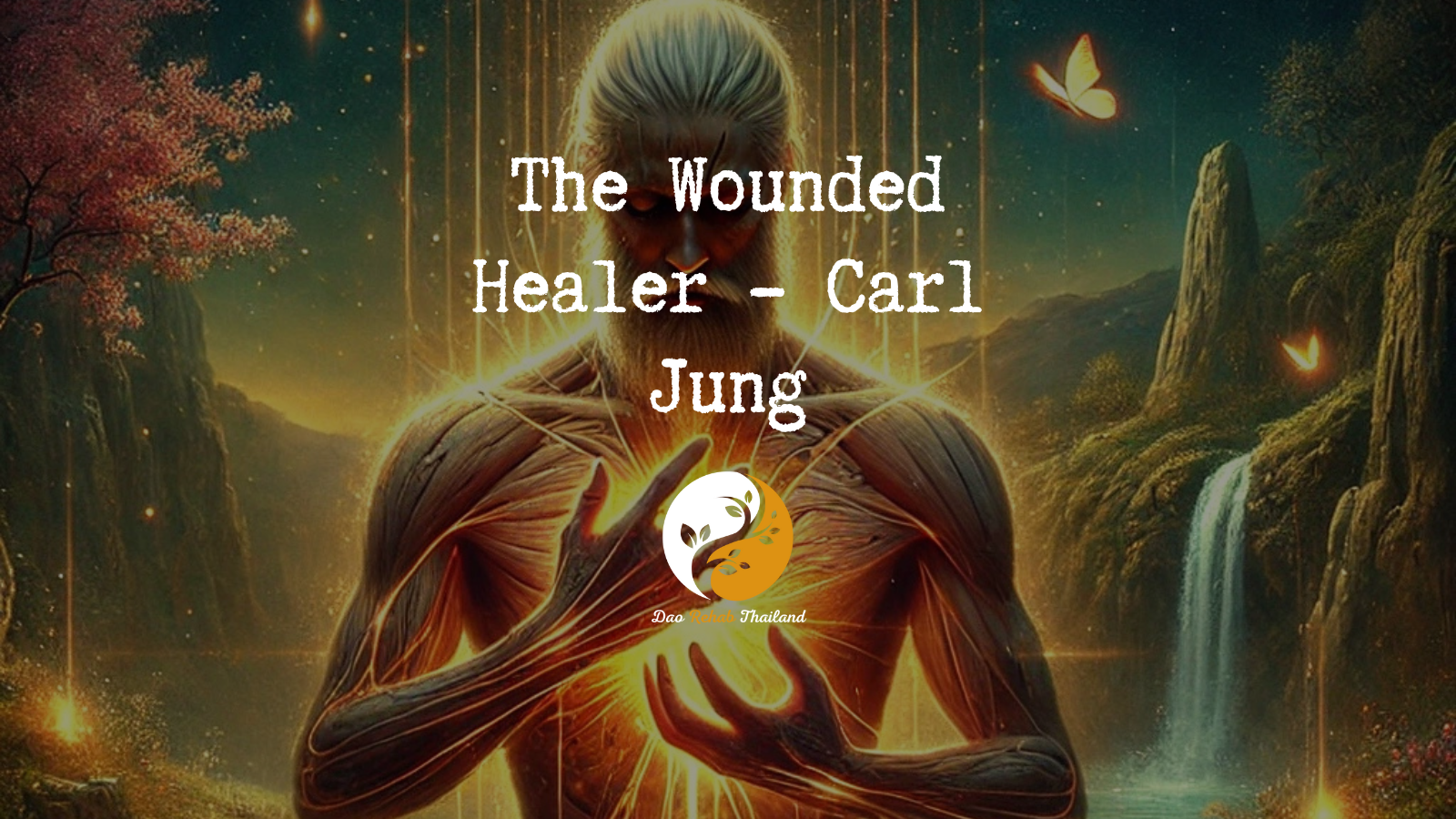
God contains the two opposites of good and evil.
God contains both opposites
“Turning the impossible into possible”

"Detox from Drugs at a Luxury Holistic Center in Thailand and Israel"

Carl Jung - God contains the two opposites of good and evil
The renowned psychologist Carl Jung believed that the Christian God is actually an unconscious entity that contains within itself all opposites. Contrary to popular Christian belief, Jung argued that God is not simply good or evil, but is a unity of both poles. This claim stems from Jung’s concept of the collective unconscious, an abstract and natural force from which all life and all human development emanate.
"Holistic Center for Trauma, Addiction, and Mental Imbalance Treatment in Thailand"
“Come to the beginning of your journey to freedom from addiction to alcohol, drugs, and pills, and rediscover your life within the serene embrace of DaoTherapy Rehab in Thailand—where holistic healing meets empowering recovery.”
DaoTherapy Holistic Rehab
Key Elements of Drugs Detox:
Medical Supervision: Drugs detox must be conducted under medical supervision, as the body may experience withdrawal symptoms. These can include nausea, anxiety, muscle aches, and insomnia. A medical team will monitor and manage these symptoms to ensure the patient’s safety and comfort.
Holistic Therapies:
Holistic Therapies: Many detox programs incorporate holistic therapies such as mindfulness, yoga, and meditation to help individuals cope with stress and anxiety during the detox process. These therapies support the mind-body connection and contribute to overall recovery.
Tapering Process
Tapering Process: Drugs detox often involves a gradual tapering of the drug to reduce withdrawal severity. Doctors will slowly decrease the dosage over time to allow the body to adjust to lower levels of the substance.
Psychological Support:
Psychological Support: Like any addiction recovery process, detox from Drugs includes psychological support. This can involve counseling, therapy, or support groups to address the mental and emotional aspects of addiction.
Post-Detox Treatment:
Post-Detox Treatment: After completing detox, continuing treatment is crucial to prevent relapse. This often includes participation in ongoing therapy, group support, and the development of new coping strategies to maintain sobriety.
The collective unconscious contains everything a person needs.
According to Jung, the collective unconscious contains everything a person needs to reach their highest version, called the “self.” The self is achieved when a person balances the negative and positive impulses within them and reaches inner unity. Similarly, the Christian God contains all the elements of reality, but is in a state of disunity, like scattered puzzle pieces. Only through conscious effort can these pieces be put together into a whole.
According to Jungian interpretation, God’s incarnation in the form of his son Jesus was an attempt to become conscious and overcome the unconscious state. However, as the story of Job illustrates, God’s becoming conscious is a challenging and painful process. God needs Job to confirm his existence, but has difficulty dealing with the moral conflict that arises from his actions. God’s need to provide an answer to Job’s suffering expresses God’s ongoing struggle to achieve consciousness.
Jung’s insights offer a unique perspective on the psychology of the Christian God and the deeper meaning of the biblical stories. They invite readers and listeners to look inward, explore their unconscious, and strive to achieve the inner unity represented by the self. At the same time, they raise fundamental questions about the nature of God and his relationship with humanity.
The Jungian perspective emphasizes the importance of pain and conflict as catalysts for development and transcendence. It encourages self-acceptance, courage to face inner shadows, and dedication to the personal journey of self-discovery. Ultimately, the profound message that emerges from the essay is that consciousness and enlightenment arise from dealing with the inner complexity of both man and God. Only by embracing the whole in its complexity can we approach the wisdom and freedom inherent in being itself.

contact us
Contact us with your questions
We would love to speak with you! Feel free to reach out with any questions.

get in touch
Schedule a free consultation
Schedule a free consultation with our team and let’s make things happen!
Psychological Evidence for the Nature of the Christian God According to Jung
Carl Jung’s Claims About the Christian God
Carl Jung’s two main claims about what he believes to be the true nature of the Christian God. In the simplest terms, Jung believes that the Christian God is unconscious, and that he is both the totality, the unity, of all opposites. He is neither an exclusively good God, as many Christians are raised to believe, nor an exclusively evil God. For Jung, God is amoral, in the sense that he is neither good nor evil, since it is impossible to act morally or immorally if a person is unconscious, nor is he all good and all evil at the same time. Having established this, I can now begin to provide further evidence to support Jung’s theses.
The Collective Unconscious: The Common Source of All Life
One of Jung’s most famous psychological theories is the collective unconscious. Jung believed that there are two sides to the human unconscious psyche – the personal and the collective. The personal unconscious is the part of our psyche that connects us to all other human beings. It is what gives humans and all other living beings the mental and physical contents they need at birth, such as instincts. The collective unconscious is the abstract and natural force from which all living beings emanate, and it is the force to which we will all return cyclically. It is also the source of a person’s personal development, containing all that is necessary for them to become a more refined individual. The collective unconscious contains everything that a person needs to develop.
The Jungian Self: The Ultimate Goal of Personal Development
The Jungian self is a concept no less important than the collective unconscious. It is a person’s true self, the highest version of themselves. It can only be achieved when a person restrains all their negative impulses and qualities, and makes proper moral use of all their positive impulses and qualities. All people are unconsciously driven towards their Jungian self, just as they were driven to breastfeed as infants. To discover how to achieve this ultimate goal, humans have invented many religious symbols and concepts, many of which were also created unconsciously. For Jung, the greatest symbol of the self was Jesus Messiah. According to Christianity, the world’s most widespread religion, Jesus is seen as the perfect man and worthy of imitation. If they can be like Messiah, they may achieve their Jungian self.
The Christian God as the Collective Unconscious
Regarding the book “Answer to Job,” Jung saw these concepts as directly related to the psychology of the Christian God. Regarding the collective unconscious, Jungians see God as indistinguishable from the collective unconscious. The collective unconscious is everything in its entirety. So is God. All living beings emanate from the collective unconscious, just as Christians see the entire universe as emanating from God. According to Christians, through God we become higher moral beings. For Jungians, it is from the collective unconscious that we derive our higher self. At the end of this process, the Jungian attains the self and the Christian perfectly imitates Jesus. And through both we theoretically attain eternity.
The Contrast Between the Unconscious as Disunity and the Self as Unity
The collective unconscious and the self supposedly contain everything we need to achieve higher development. However, there is one fundamental difference between them. The collective unconscious may contain everything, but it is a disunity, like a box of scattered Lego pieces. In contrast, the self is a unity of all components. If all the Lego pieces were to fit together into a perfect picture of beauty, that would be the self. Disunity reflects the nature of the unconscious and also Jung’s concept of God. It is everything, but the contents within it do not communicate with each other. So, as I said in the previous video, God has omniscience, but He does not use it. His omniscience is scattered, like unjoined Lego pieces. Only through conscious effort can they be put together.
The Incarnation of God through Jesus as an Attempt to Become Conscious
Perhaps the idea may arise that the incarnation of God in Jesus, His Son, was an attempt to become conscious. God could not have become conscious before Jesus was born, because He did not have a mortal body. As we stated in the previous video, consciousness only arises from limitation, from pain. As Edward Edinger quoted, the experience of weakness or defeat is a synchronicity for consciousness. You cannot be a conscious being if you cannot experience weakness and defeat. I do not believe that it is possible to develop consciousness in immortal beings, if such exist. But why would God want to become conscious through Jesus? We will discuss this further as the video and series progress.
The Unconscious’s Need to Be Seen
There is another psychological element that I would like to introduce, and that is the unconscious’s desire to be seen, so to speak. God needs Job’s loyalty so much that he puts him through every possible stress test just to make sure that loyalty is genuine. If we go with the theory that God is the unconscious, his behavior reflects the nature of the contents of our unconscious. For example, if you do something immoral, your conscience torments you. Why does it torment you? It is because you are trying to make that immoral act unconscious. In the case of God and Job, God does not exist as an entity unless there is a conscious being to confirm his existence.
God’s Coping with Becoming Conscious
As God approaches self-consciousness through his relationship with the conscious Job, he copes with it, just as humans cope with the confrontation with their unconscious. He presents his entire array of power to Job in order to avoid becoming conscious. He would have preferred to remain in a state of unconsciousness while humans acknowledged His presence. However, given Job’s higher moral status, God cannot help but yield to self-reflection. God’s immoral actions in the book of Job cannot develop into full consciousness without passing through the mortal ego to bring that consciousness to fruition. In this case, that ego was Job’s.
God’s Need to Answer Job
God became aware of the injustice He had done to Job. He was no longer the moral and righteous supreme ruler of the universe. He was forever changed. He was no longer completely unconscious, for now He had become conscious in at least one capacity. The consequences of this event have dramatic implications. If God is to restore His original status as omniscient, omnipotent, ever-present, and righteous, He will have to provide a response, an answer, to the tragedy He had inflicted on Job. This answer is a continuing struggle toward consciousness. We will discover the outcome of this struggle in the future, but first we must examine the events that preceded it in the Scriptures—the events that support Jung’s theses.
The article presented Carl Jung’s main claims about the true nature of the Christian God, focusing on psychological evidence. Key concepts such as the collective unconscious and the Jungian self were developed, and were linked to Jung’s psychology of God. The article described God’s need to be seen and known by humans, and his struggle with becoming conscious through the story of Job. Finally, the need for God to atone for the injustice done to Job, through a continuing struggle to achieve consciousness, was emphasized. This article provides a foundation for a deeper understanding of Jung’s psychological view of the Christian God.
Central insights
1. The Christian God is unconscious and contains all opposites within himself.
2. The collective unconscious is a common source for all life.
3. The Jungian self is the ultimate goal of personal development.
4. The unconscious as disunity is opposed to the self as unity.
5. The incarnation of God through Jesus was an attempt to become conscious.
6. The Christian God needs to be seen and known by humans.
7. God deals with becoming conscious through the story of Job.
8. God needs to answer Job for the injustice done to him.
9. God’s answer is an ongoing struggle to achieve consciousness.
10. Jungian psychology offers a unique perspective on the nature of the Christian God.
practical advice:
1. Explore your unconscious to better understand yourself and the world around you.
2. Strive to achieve your Jungian self through a balance between inner light and darkness.
3. Be open to the idea that God may be a complex being and not necessarily just good or evil.
4. Use pain and defeats as opportunities for personal growth and development.
5. Don’t be afraid to confront your unconscious sides on the path to achieving higher consciousness.
6. Remember that personal development is an ongoing journey that requires conscious effort and determination.
Psychological Support:
Psychological Support: Like any addiction recovery process, detox from Subutex includes psychological support. This can involve counseling, therapy, or support groups to address the mental and emotional aspects of addiction.
Thought provoking questions:
1. How have you understood the concept of the collective unconscious and its impact on your life?
2. Do you identify with the idea of God as a being that contains all opposites? Why or why not?
3. How can you work to get closer to your Jungian self?
4. Do you see the pain and difficulties in your life as opportunities for growth and development?
5. What is your opinion on the need for God to be known and seen by humans?








